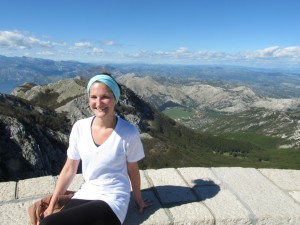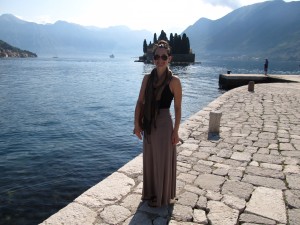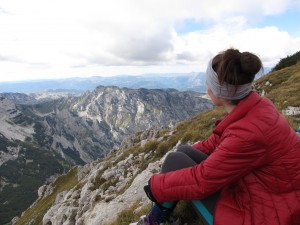
Recently while scanning Twitter for the latest fellowship news, I stumbled across this tweet, which includes a stunning early dawn picture of a lake surrounded by mountains. The tweet reads: “Taken from bed in Perast this morning. If this doesn’t get you up for a run, nothing will. #montenegro #fulbright.” A Fulbright in Montenegro? I had to learn more.
Kate Poisson is a current Fulbright English Teaching Assistant (ETA) Fellow in Podgorica, Montenegro. She has gained a lot from her work and study abroad experiences and was excited to share more about her fellowship journey.
1. What inspired you to apply for the Fulbright Fellowship?
Although I grew up in a relatively homogeneous town in Michigan, I have been interested in learning about different places and cultures for as long as I can remember. As an undergraduate student, my open mind and eagerness to learn about the world led me to apply and gain admission into Michigan State University’s Social Sciences in the Eastern Mediterranean study abroad program. While abroad, I developed a love for the Mediterranean and found myself fascinated by the number of unique cultures in the area. I learned much about Globalization and Political Sociology in my studies as I traveled throughout the Greek Isles and to Turkey; but the people I met and the experiences I had along the way taught me far more than any lecture I sat through. I obtained my bachelor’s degree in Psychology with a specialization in Health Promotion but my newfound passion for International Education prompted me to enroll as a master’s candidate in Higher Education Administration in the University of Michigan’s Center for the Study of Higher and Postsecondary Education (CSHPE).
I continued on my quest to learn about different people and cultures throughout graduate school by taking courses that included international, intercultural, and social justice components and traveling whenever possible. I was hired into the University of Michigan’s Division of Student Affairs after graduating in 2010 and had the opportunity to supervise, advise, and plan programs for diverse groups of students and student organizations. While at U-M, I encouraged my students to explore different perspectives, seek out intercultural opportunities, and challenge themselves to step outside of their comfort zone. I challenge myself to do the same and, after four years in Ann Arbor, I decided it was time to practice what I preach and explore higher education in a new context.

I wanted to return to the Mediterranean to work with a new population of university students. After doing some research, I decided to apply to become a Fulbright English Teaching Assistant in Montenegro. The Fulbright Program gave me the opportunity to connect many of my passions – higher education, travel, cross-cultural programming, leadership development, and relationship building. I chose to apply to work in Montenegro because of the country’s vast natural beauty and because this is an exciting time in its history. Although it is a small country, Montenegro’s relatively new independence, its plans to join the European Union, and its location as a gateway between the East and West make it a key stakeholder in the future of Europe and the world. Thus, it is an ideal location to teach, learn from, and build relationships with the people who are shaping that future – university students.
While in Montenegro, I hope to act as an ambassador by teaching English and American culture, but I also hope to extend beyond my responsibilities as an ETA to create leadership opportunities for students to participate in outside of the classroom. It is this next generation of leaders who will shape Montenegro in the coming years, so it is crucial that they are engaged in experiences that allow them to learn, grow, and gain real-life experience that transcend lectures and textbooks and focus on promoting the public good.
I also expect to learn a lot from my students and peers in Montenegro. The work/life culture is very different from that of the U.S. and I am constantly challenged to adapt my work style and ways of thinking. Shifts in perspective can be one of the most exciting parts of intercultural exchanges and I look forward to bringing what I learn here in Montenegro back with me to the States.
2. What have you enjoyed most about your fellowship so far?
I have been in Montenegro for nearly two months now and, aside from the occasional moments of frustration and homesickness, my experience has been largely positive. The Montenegrin people are warm, welcoming, and eager to help me when needed. I am working with students in a variety of capacities at the University of Montenegro’s Institute of Foreign Languages and also assisting with programs at the local American Corner. It is exciting to learn about Montenegro’s educational system, teach, and begin to contribute to the community.

Montenegro is a beautiful country and its small size makes it easy to travel around quickly – you could potentially lay out on a sunny beach and then go skiing in the mountains in the same day! I have been lucky enough to go on some phenomenal hikes through the mountains, explore old cities on the coast, and get delicious food at the green markets and cafes around Podgorica. However, my most memorable moments so far have been the times I have been invited to spend time with my new friends and their families in their homes. I was able to spend one day on a family vineyard and got to help harvest grapes for wine. Throughout the day, I was able to interact with three generations of the family, learn about the land and winemaking process, and enjoy delicious, organic wine, rakija, and homemade Montenegrin cuisine. It was wonderful! I had another great evening at a friend’s family’s Slava, the celebration of their family’s patron saint. It was a beautiful celebration with family, friends, and a homemade feast.
While traveling and sightseeing is fun, it is these relationship-building experiences that I really value. The best way to learn about a culture is to really get to know its people… and, of course, to eat a lot of delicious food!
3. What do you think made your fellowship application stand out?
The Fulbright ETA application process can seem complex but, when all is said and done, you really only have two pages to make your case for being chosen: your Personal Statement and your Statement of Purpose. While you also submit your resume and three letters of recommendation, these one-pagers are your opportunity to tell the Fulbright committee why you, out of all of the applicants, are the best choice for the specific position and country you are applying to. This means you need to be clear, concise, and engaging. The best pieces of advice I can give are as follows:
Research your country of preference.
Look at the history, current events, and values of your country of preference and make a solid argument about how your skills and experiences directly connect to that specific location/position. The Fulbright website gives position descriptions for each available grant – look these over and be sure you meet the criteria for the position and articulate how you would not only meet, but exceed, expectations for the position. You should also think about what you are trying to get out of your Fulbright experience. Read the position descriptions to ensure grants in your country meet your expectations. I studied higher education and plan to continue working within the realm of universities and student affairs when I return to the U.S., so it was important to me to work within an institution of higher education. The positions in Montenegro met that piece of criteria.
Make yourself standout.
You only have two sheets of paper to describe why YOU are the right candidate. Don’t be boring. Tell a story, draw them in, make them remember you. I looked at both statements as my opportunity to tell my story. I incorporated personal anecdotes rather than simply restating what is in my resume. To be honest, I was a bit worried because some of the trusted people I had look over my application told me that my Statement of Purpose sounded too much like a Personal Statement. I considered what they had to say but, in the end, decided to go with my gut and tell my story in my own way. It worked for me. Think about how you want to express your unique story.
Connect your passions.
Don’t just talk about you and what you’ve done. Talk about what you want to do on your Fulbright year, and beyond. I am a firm believer that an intercultural experience could be beneficial to any person, no matter where they are from or what they have studied. However, too many people have these types of experiences and do not give themselves the space to reflect upon, process, and make meaning of their experience. Your application should not only demonstrate what you have previously done, but also what you hope to do while you are in-country, and how you plan to continue connecting your Fulbright experience to the work you are passionate about once your grant term ends.
Kate Poisson grew up as one of the youngest in a large family in Lake Orion, Michigan and went on to attend Michigan State University (MSU) in East Lansing for her undergraduate degree in Psychology with a specialization in Health Promotion and completed a semester-long program studying Social Sciences in the Eastern Mediterranean while living in Lesvos, Greece. After graduating from MSU in 2009, she went on to graduate school at the University of Michigan’s (U-M) Center for the Study of Higher and Post-Secondary Education (CSHPE). While there, she obtained a masters degree in Higher Education and focused her studies toward Advising and Student Affairs.
Kate was hired as a full-time employee in U-M’s Division of Student Affairs following her graduation in 2010 and worked as a Student Involvement Advisor until departing for Montenegro earlier this fall. Her main responsibilities included student advising, leadership education initiatives, student programming, and student organization advising. She also has a particular interest in student health and wellness and work/life balance initiatives. In her free time, Kate enjoys spending time with friends and family, reading, writing, hiking, playing sports, and sharing delicious meals with friends. Kate is living in Podgorica, Montenegro and will be working at the University of Montenegro’s Institute of Foreign Languages for the 2013-2014 school year as a Fulbright English Teaching Assistant. Contact Kate Poisson.
© Victoria Johnson 2013, all rights reserved